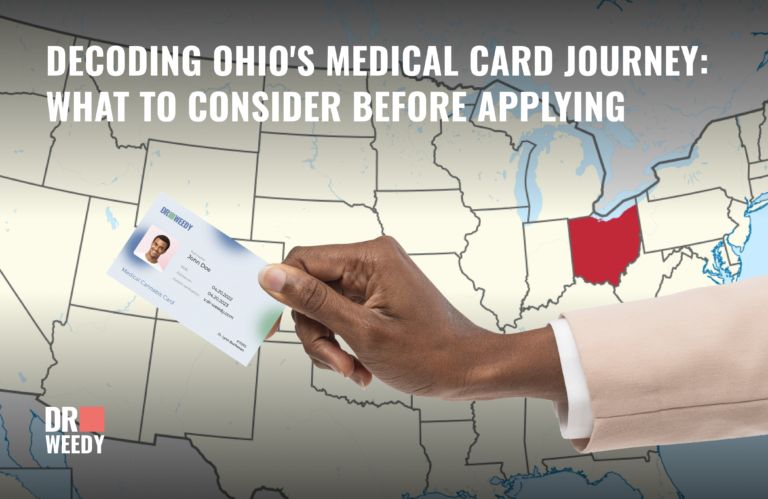Decoding Ohio’s Medical Card Journey: What to Consider Before Applying

Getting a medical marijuana card in Ohio seems like an easy choice – it grants you legal access to cannabis products that can help treat a variety of conditions. But the decision is not always so simple. While recognizing the potential benefits, it’s essential to be informed about various considerations before becoming a certified MMJ patient in Ohio. This guide will explore important aspects without discouraging potential applicants..
Legal Complexities: Federal vs. Local Laws in Ohio’s Marijuana Realm

Navigating the terrain of Ohio’s medical marijuana landscape reveals a critical tension between state and federal regulations. While medical marijuana is legal at the state level in Ohio, it remains illegal federally. This clash between state and federal law introduces complications, impacting cardholders in various aspects, including:
- Federal jobs and housing assistance barred due to federal marijuana prohibition (*)
- Gun purchases prohibited regardless of medical card status
- Workplace drug testing still allowed despite medical status
- Medical justification not accepted as defense in interstate travel
Ohio Employment Concerns and Protections

One significant worry for prospective MMJ patients is the impact on employment. Unfortunately, under current Ohio law, employers retain the right to drug test employees and terminate employment based on positive THC tests – even for cardholding patients.
Some exceptions in special cases include:
- Reasonable accommodation required for certain disabilities under the ADA (*)
- Potential wrongful termination lawsuits if rules were unevenly enforced
While some exceptions exist, job protections are limited. Understanding your workplace’s policies, participating in drug-free programs, and discreetly discussing your situation with HR can help navigate potential challenges.
In addition to employment termination, Ohio’s current legal landscape poses potential challenges for medical marijuana users, affecting their rights and benefits in the workplace. Considerations include:
- Testing positive may impact Workers Compensation claims
- Unemployment benefits may be disputed or denied
- Job licensing can be revoked in safety-sensitive fields like commercial transport
Note that these challenges may vary based on individual circumstances and are subject to evolving legal interpretations.
What can I do to avoid problems with my employer in Ohio?
Navigating the intersection of medical marijuana use and employment in Ohio demands a thoughtful approach. Here are steps you can consider to effectively address potential challenges with your employer in the realm of medical marijuana use.:
- Review Workplace Policies: Familiarize yourself with your company’s drug policies and testing procedures outlined in the employee handbook. Understand the consequences of a positive test result.
- Check Ohio’s Drug-Free Workplace Program: Research whether your company participates in Ohio’s Drug-Free Workplace program. Be aware that their tolerance for marijuana may be minimal.
- Gauge Company Culture: Discreetly ask trusted co-workers about the company culture around marijuana. Learn about the frequency of drug tests and the overall attitude toward cannabis.
- Engage with HR: Consider talking to your HR department about obtaining a medical marijuana card for your health condition. See if accommodations like switching departments or allowing leave time are possible.
- Present a Productive Conversation: Emphasize how medical marijuana can enhance your productivity and manage your chronic condition, potentially contributing to a more efficient work environment.
- Be Prepared to Compromise: Propose compromises such as using external medical marijuana resources or taking leave time during initial treatment. Be open to negotiation and demonstrate a commitment to responsible use.
- Legal Consultation: Have a lawyer knowledgeable about Ohio employment law review your employee policies in case you need to appeal any discipline for legal medical use.
- Explore Progressive Industries: If you anticipate challenges with employers resistant to marijuana use, consider seeking employment in industries more receptive to cannabis or companies with marijuana-friendly policies.
By taking these proactive measures, you can better position yourself to handle potential challenges with your employer regarding medical marijuana use in Ohio.
Family Court Considerations
When it comes to family court proceedings, especially child custody disputes, the potential impact of medical marijuana use is a nuanced consideration. Even if treatment is legally justified, there is bias against permitting cannabis use around children. The medical card status could influence judgments on:
- Child custody decisions between separated parents
- Visitation schedules and supervision requirements
- Qualification as foster or adoptive parents
While these considerations may raise concerns, taking proactive steps can help minimize the potential for legal intervention or loss of parental rights:
- Be discreet about marijuana use around children, ensuring it doesn’t impact their well-being.
- Abstain from use during times of allotted custody or visitation with your children.
- Choose medical marijuana products with low THC content to mitigate any potential intoxicating effects.
- Offer third-party monitoring solutions if concerns about drug use arise during legal proceedings.
- Emphasize commitment to physician-advised treatment plans and highlight responsible use of medical marijuana.
By adopting these precautions, medical marijuana patients can navigate family court proceedings in Ohio more smoothly, addressing concerns and ensuring the focus remains on the well-being of the children involved.
Navigating Driving Considerations as a Medical Marijuana Patient in Ohio
The issue of marijuana-impaired driving poses certain challenges for medicinal patients, particularly concerning the lack of defined legal thresholds in Ohio. While the state acknowledges the therapeutic benefits of medical marijuana, the absence of clear standards for impairment creates uncertainty for patients. It’s essential to understand that:
- Legal Thresholds: Ohio laws do not define clear standards or thresholds for determining marijuana impairment while driving.
- Residual Traces and DUID Convictions: Some legal experts argue that patients following medical treatment plans should be exempt from Driving Under the Influence of Drugs (DUID) convictions based on residual traces of compounds alone. But so far, Ohio courts have yet to consistently uphold this viewpoint. As testing standards improve for THC, perhaps measured intoxication limits will someday be defined and accepted.
Understanding Social Service Implications for Ohio MMJ Patients

Along with potential impacts on employment and worker’s rights, there are other aspects to consider when holding a medical marijuana card in Ohio. Social services, a crucial support system for many, may have limitations for individuals who use medical marijuana. While there are considerations to keep in mind, it’s essential to approach the topic with nuance:
- Federal housing assistance may pose challenges for known drug users, including marijuana users. However, discretion about medical use when applying may avoid automatic disqualification.
- Concerns have been raised about potential reductions in SNAP and food stamp benefits for medical marijuana patients in some cases. But recent court rulings blocked this welfare policy, so benefits should remain intact.
- College financial aid applications still contain questions about past drug convictions which could impact student loans and grants. While these restrictions have been reduced, partial aid loss is still possible for marijuana-related offenses. Medical card status itself does not trigger aid denial.
Navigating these challenges requires a strategic approach:
- Discretion in Housing Applications: When applying for federal housing assistance, carefully consider how you communicate your medical marijuana use, emphasizing its legal status.
- Know Your Rights: Stay informed about the latest legal developments to understand your rights regarding social services.
- Honesty and Advocacy: Be truthful about past drug convictions when necessary, but advocate for yourself by highlighting the legal nature of your medical marijuana use.
By navigating these challenges with care and awareness, medical marijuana patients can strive to access social services without unnecessary hindrances.
Making an Informed Decision
Choosing to pursue a medical marijuana card in Ohio requires careful consideration of potential downsides. While the therapeutic benefits can be significant, patients should be aware of the legal complexities surrounding employment, family court, driving, and social services.
Your medical marijuana status in Ohio is protected health information, and employers will not be notified if you get a medical marijuana card in Ohio unless you disclose it. Your status as a patient is private health information protected by HIPAA. The Ohio Medical Marijuana Registry cannot be accessed by employers. However, it’s essential to recognize the possibility of termination based on drug test results. Consulting with a doctor and a marijuana-focused lawyer can provide guidance on responsible medicinal use, legal protections, and potential risks. Navigating Ohio’s complex legal landscape as an informed and cautious patient is crucial to maximizing the benefits of medical marijuana.


























